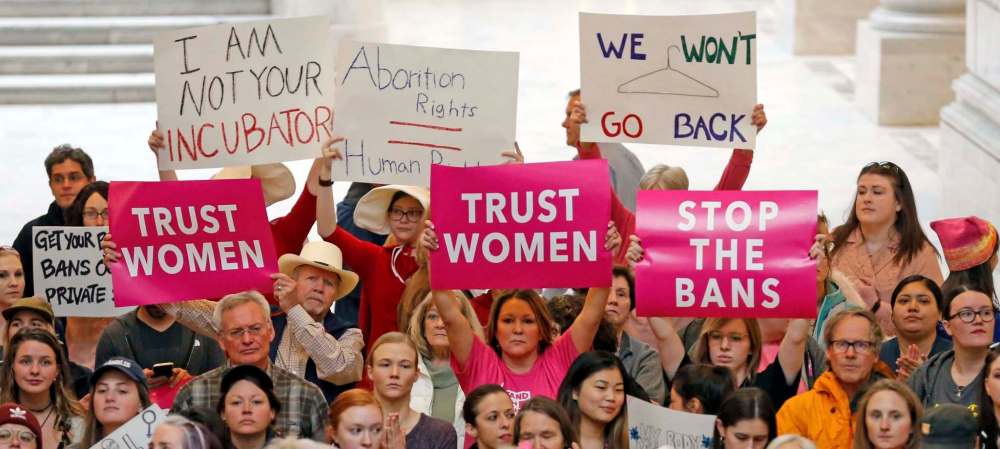No time for complacency on reproductive rights
Advertisement
Read this article for free:
or
Already have an account? Log in here »
To continue reading, please subscribe:
Monthly Digital Subscription
$0 for the first 4 weeks*
- Enjoy unlimited reading on winnipegfreepress.com
- Read the E-Edition, our digital replica newspaper
- Access News Break, our award-winning app
- Play interactive puzzles
*No charge for 4 weeks then price increases to the regular rate of $19.00 plus GST every four weeks. Offer available to new and qualified returning subscribers only. Cancel any time.
Monthly Digital Subscription
$4.75/week*
- Enjoy unlimited reading on winnipegfreepress.com
- Read the E-Edition, our digital replica newspaper
- Access News Break, our award-winning app
- Play interactive puzzles
*Billed as $19 plus GST every four weeks. Cancel any time.
To continue reading, please subscribe:
Add Free Press access to your Brandon Sun subscription for only an additional
$1 for the first 4 weeks*
*Your next subscription payment will increase by $1.00 and you will be charged $16.99 plus GST for four weeks. After four weeks, your payment will increase to $23.99 plus GST every four weeks.
Read unlimited articles for free today:
or
Already have an account? Log in here »
Hey there, time traveller!
This article was published 23/05/2019 (2394 days ago), so information in it may no longer be current.
It can’t happen here.
That’s what I have heard over and over again, since various states started to roll out their repressive responses to women’s reproductive freedom in Trump’s America.
It would be political suicide for a Canadian government to implement an abortion ban, I’ve been assured. The Charter of Rights and Freedoms would prevent this from happening, others have said, holding on with their small-L liberal indignation.

I am not that optimistic.
The stunning decisions in a number of American states to restrict abortions at six weeks — so-called “heartbeat” laws — means that most women will be unable to access the care they need because they won’t even know they are pregnant. The penalties are also incredibly harsh, with Texas at one point considering the death penalty for abortion providers. Thankfully, that bill failed to pass.
While abortion may not be against the law in Canada, there are currently no laws in place that ensure Canadian women have the right to access safe and affordable abortions. More importantly, access to abortions varies from province to province and within provinces, by region.
Add to that the stigma surrounding abortions, ignited every time puritanical thinking overrides women’s right to choose, and you have a pretty potent mix that controls how women feel about their fundamental right to body autonomy.
In Manitoba, there is no physician available outside of Winnipeg or Brandon who offers surgical abortions, and the wait-lists are long. The medical abortion drug Mifegymiso (a two-pill regimen composed of mifepristone and misoprostal) works for pregnancies less than nine weeks and is available in some pharmacies in Manitoba, but not all, and it is covered by some pharmaceutical plans, but not all.
For those who do not have benefits coverage, the pill costs $350. A group of medical students at the University of Manitoba is lobbying the provincial government to join other provinces by making the drug free for everyone. So far… nothing.
Plan B, or the “morning-after pill,” which can be used when there is a birth-control failure or in the event of sexual assault, has recently been found to be less effective for women who are overweight. It is also not readily available in pharmacies outside Winnipeg, and its cost is not covered by drug plans. The cost — around $30 — is not prohibitive if you’re middle class, but if you’re living on a limited income, that, too, can be pricey.
So the claim that Canada has free, accessible abortions is clearly not true. Not if you’re poor. Not if you live outside of southern Manitoba. Certainly not if you happen to have a health-care provider or a pharmacy that refuses to provide you with Mifegymiso or Plan B.
(For those of you interested in sending the government the message that Mifegymiso should be free for everyone, there is a rally at the provincial legislature on June 3 from 11 a.m. to 1 p.m. For more information, contact the campaign organizers on Facebook at Make Mife Free.)
As for the political will to ensure surgical and medical abortions remain available in Canada, the federal Conservatives under party leader Andrew Scheer have made it clear they would not reopen the abortion debate. However, that doesn’t mean that he would stop private members from putting forward bills on their own.
While the chances of those bills surviving to become law may be slim, there are at least 12 MPs in Scheer’s caucus who have openly attended right-to-life rallies or shown right-to-life videos. These included status of women critic Rachael Harder. Furthermore, in August 2018, a resolution to reopen the abortion debate in Canada was narrowly defeated at the federal party’s convention in New Brunswick.
In contrast, while federal Liberal candidates under leader Justin Trudeau must affirm that they are pro-choice in order to run under the banner of the party, there is no such requirement for the Conservatives. As one right-to-life organization proudly proclaimed, private member’s bills could mean a law could be introduced and passed if a Scheer government were elected.
Closer to home, the Pallister government’s own health minister refuses to discuss abortion issues, even though it is well within his portfolio. Cameron Friesen will instead refer any questions to the Status of Women Minister Rochelle Squires. Friesen and former health minister Kelvin Goertzen both represent staunchly conservative rural constituencies.
That perhaps explains, then, how access to abortion in this province is more restricted than in most other provinces.
It is easy for us to say that it won’t happen again in Canada, but the new face of the anti-abortion movement no longer is a middle-aged matron clutching rosary beads, or an angry man screaming in protest while brandishing signs adorned with images of aborted fetuses (although those certainly remain).
According to an exhaustive study by academics Paul Saurette and Kelly Gordon, the new anti-abortion movement is headed by young, well-educated women who consider themselves feminists and who see their role as progressive and humanitarian. For these new crusaders, to be against abortion is to be against “female gendercide.”
It can’t happen here? I’m not that optimistic. I protested in the 1980s for my right to have access to abortions. I can’t believe I might have to do it again 30 years later.
Shannon Sampert is a political scientist at the University of Winnipeg. She still has her protest signs from the last time and she’s not afraid to use them.
s.sampert@uwinnipeg.ca
Twitter: @paulysigh





